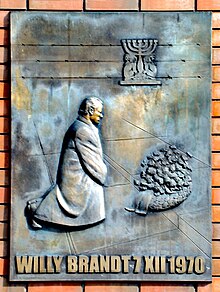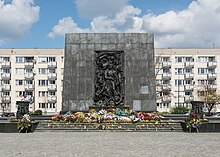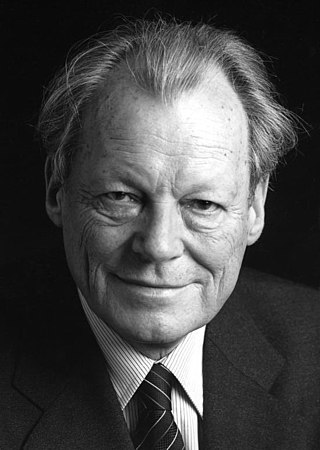
Willy Brandt was a German politician and statesman who was leader of the Social Democratic Party of Germany (SPD) from 1964 to 1987 and served as the chancellor of West Germany from 1969 to 1974. He was awarded the Nobel Peace Prize in 1971 for his efforts to strengthen cooperation in western Europe through the EEC and to achieve reconciliation between West Germany and the countries of Eastern Europe. He was the first Social Democratic chancellor since 1930.

Neue Ostpolitik, or Ostpolitik for short, was the normalization of relations between the Federal Republic of Germany and Eastern Europe, particularly the German Democratic Republic beginning in 1969. Influenced by Egon Bahr, who proposed "change through rapprochement" in a 1963 speech at the Evangelische Akademie Tutzing, the policies were implemented beginning with Willy Brandt, fourth Chancellor of the FRG from 1969 to 1974, and winner of the 1971 Nobel Prize for Peace for his efforts to place this policy at the acme of the FRG.
The Treaty of Moscow was signed on 12 August 1970 between the Soviet Union and West Germany. It was signed by Willy Brandt and Walter Scheel for West Germany's side and by Alexei Kosygin and Andrei Gromyko for the Soviet Union.

Axel Cäsar Springer was a German publisher and founder of what is now Axel Springer SE, the largest media publishing firm in Europe. By the early 1960s his print titles dominated the West German daily press market. His Bild Zeitung became the nation's tabloid.

The Warsaw concentration camp was a German concentration camp in occupied Poland during World War II. It was formed on the base of the now-nonexistent Gęsiówka prison, in what is today the Warsaw neighbourhood of Muranów, on the order of Reichsführer-SS Heinrich Himmler. The camp operated from July 1943 to August 1944.
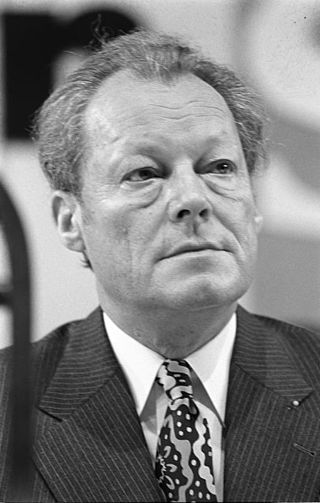
Federal elections were held in West Germany on 19 November 1972 to elect the members of the 7th Bundestag. In the first snap elections since the resumption of democratic elections in 1949, the Social Democratic Party became the largest party in parliament for the first time since 1930, winning 230 of the 496 seats. The coalition with the Free Democratic Party was resumed.
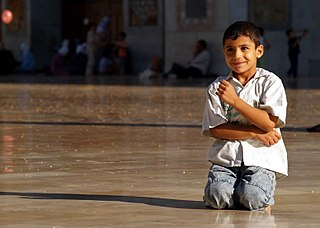
Kneeling is a basic human position where one or both knees touch the ground. Kneeling is defined as “to position the body so that one or both knees rest on the floor,” according to Merriam-Webster. Kneeling when only composed of one knee, and not both, is called genuflection.
The Treaty of Warsaw was a treaty between the Federal Republic of Germany and the People's Republic of Poland. It was signed by Chancellor Willy Brandt and Prime Minister Józef Cyrankiewicz at the Presidential Palace on 7 December 1970, and it was ratified by the West German Bundestag on 17 May 1972.

Egon Karl-Heinz Bahr was a German SPD politician.

Reinhold Rehs was a German politician and chairman of the Federation of Expellees in 1967-70.
Taking a knee can refer to
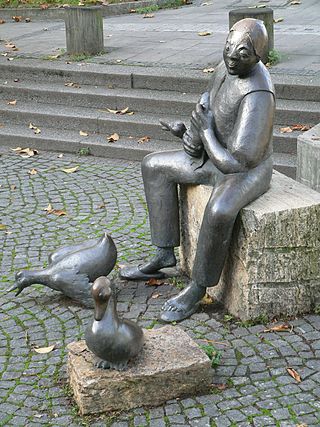
Hans Bayer, known by the pseudonym Thaddäus Troll, was a German journalist and writer and one of the most prominent modern poets in the Swabian German dialect. In his later years, he was also an active campaigner for libraries and for support, pension rights, and fair publishing contracts for writers. He was born in Cannstatt, a suburb of Stuttgart, and committed suicide there at the age of 66. The literary award Thaddäus-Troll-Preis is named in his honour.
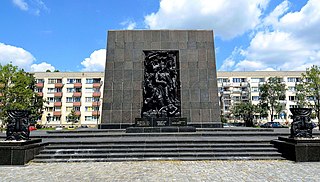
The Monument to the Ghetto Heroes is a monument in Warsaw, Poland, commemorating the Warsaw Ghetto Uprising of 1943 during the Second World War. It is located in the area which was formerly a part of the Warsaw Ghetto, at the spot where the first armed clash of the uprising took place.

The Willy Brandt Monument in Warsaw is a monument located in Willy Brandt Square, Warsaw, Poland, near the Museum of the History of Polish Jews. It commemorates German chancellor Willy Brandt and the Warschauer Kniefall, Brandt's act of kneeling at a monument to the Warsaw Ghetto Uprising during his visit in 1970.

Pyotr Andreievitch Abrasimov was a Soviet war hero and politician who became a career diplomat. He served his country as ambassador successively in China, France, Poland and East Germany.
Philipp Kochheim is a German theatre director, author and scenic designer. He also wrote the libretto for the opera Kniefall von Warschau named after Willy Brandt's genuflexion in Warsaw on 7 December 1970, with music by Gerhard Rosenfeld, which premiered in 1997 in the Opernhaus Dortmund, directed by John Dew.

The Polish Memorial in Palmiry was established in 1948. It is located in a forest near the village of Palmiry (Czosnów) within the Kampinos National Park in the Masovian Voivodeship. During the German occupation of Poland between 1939 and 1943, the Gestapo and SS units carried out secret mass shootings of the Polish civilian population here. The memorial is located near the former mass graves.

The 1971 Nobel Peace Prize was awarded to the Chancellor of Germany Willy Brandt (1913–1992) "for paving the way for a meaningful dialogue between East and West." Because of his efforts to strengthen cooperation in western Europe through the European Economic Community (EEC) and to achieve reconciliation between West Germany and the countries of Eastern Europe, he became the fourth German recipient of the prestigious Peace Prize.
